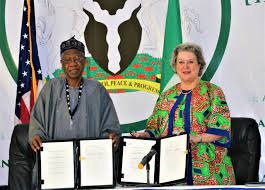The Federal Government and the United States on Thursday signed the Cultural Property Implementation Act (CPIA) Agreement.
According to the Minister of Information and Culture, Lai Mohammed, the CPIA will reduce the pillage of Nigeria’s ancient arts which are mostly smuggled to Europe, the US and other places for the benefit of art collectors.
Mohammed said the signing of the MoU became necessary because, despite all efforts by the Ministry of Information and Culture and the National Commission for Museums and Monuments, with the assistance of law enforcement agencies, to prevent illicit export of the nation’s archaeological and ethnological materials, widespread looting and illicit excavation of these materials still continue.
He said this when he signed a Memorandum of Understanding on the CPIA with the US Ambassador to Nigeria, Mary Beth Leonard, in the presence of the Minister of Foreign Affairs, Mr. Geoffrey Onyeama, in Abuja.
Special Assistant to the President on Media, Office of the Minister of Information and Culture, Segun Adeyemi, disclosed this in a statement titled ‘Nigeria, US Sign Pact to Reduce Illicit Trafficking of Ancient Arts.’
Mohammed was quoted as saying, “This legislation was enacted by the United States to restrict the importation into the US of archaeological materials ranging in date from 1500 B.C. to A.D. 1770 as well as ethnological materials including those associated with royal activity, religious activity, etc. from nations that have entered into the kind of bilateral initiative that we are signing here with the United States today.”
The Minister said on the basis of the agreement, Nigerian antiquities being imported into the US without the requisite Export Permit will be seized at the border of the US and returned to Nigeria without the arduous and costly task of going through the labyrinth of judicial and diplomatic processes.
“We are optimistic that this agreement will reduce the pillage of our irreplaceable archaeological and ethnological materials, as the market for these materials is being shut in the United States against illicit traffickers.
“The agreement will last for an initial period of five years. If it works well, as we anticipate it will, it shall be renewed for a longer term. We implore other friendly nations to take a cue from the United States of America and join us in finding means to prevent the illegal importation of our antiquities into their countries,” he said.
The Minister, who thanked the US government, in particular the US Embassy in Nigeria, for making the MoU possible, said the Nigerian government looks forward to a diligent implementation of the landmark agreement, so it can become a game-changer in the nation’s efforts to prevent the looting of its priceless ancient works of art.
In her remarks, the US Ambassador to Nigeria, Beth Leonard, said the agreement is aimed at preserving, restoring and protecting Nigeria’s cultural heritage.
“In Nigeria, over the past decade, the US Mission has partnered with the Nigerian government and state institutions to preserve cultural landmarks and sites through projects worth over one million dollars and funded by the US Ambassador’s Fund for Cultural Preservation.
“Just last November, I signed a grant award to digitally survey the Busanyin Shrine located within the Osun Osogbo Sacred Grove. That $125,000 grant will help document a series of shrines within the Grove and provide training to local professionals in digital tools and cultural heritage management,” she said.

























